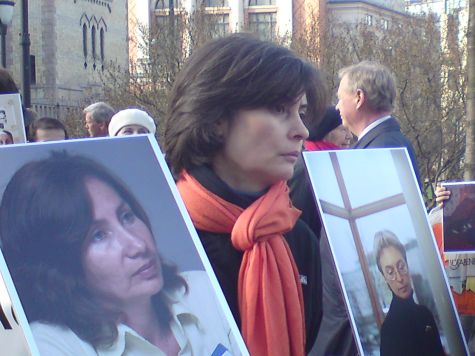 These brave men and women are shaping history and present to an audience capable of effecting change – leaders from politics and business, renowned journalists, social entrepreneurs, and others.
These brave men and women are shaping history and present to an audience capable of effecting change – leaders from politics and business, renowned journalists, social entrepreneurs, and others.
In his presentation at the Oslo Freedom Forum’s last day Bjørn Engesland, secretary general in the Norwegian Helsinki Committee, said that the main goal of human rights activists is to challenge governments to become bolder in criticising abuses and standing up for human rights defenders.
Human rights movement is back where it started
“Human rights activists these days face tough challenges in many parts of the world. My organisation works primarily in Europe and the former Soviet Union, documenting abuses, supporting domestic organisations and conducting human rights education programs. In some of these countries the authorities not only impede human rights work. Human rights defenders are physically attacked, and some of our colleagues – like Natalya Estemirova fr om the Chechen Republic – have been killed”, told Engesland (picture on the right).
om the Chechen Republic – have been killed”, told Engesland (picture on the right).
According to him, although these attacks take place against the background of enormous progress for the human rights movement over the last 20 years – it became stronger and more effective in exposing government abuse – they also point to a backlash and in some ways the human rights movement is back where it started.
The starting point of the human rights movement in Central and Eastern Europe was the 1975 Helsinki Final Act. Then for the first time communist countries accepted the principle that human rights should be respected. Civil society activists afterwards started to make efficient use of Helsinki principles, demanding compliance from the authorities. Subsequently the Norwegian Helsinki Committee was founded in 1977 to support brave individuals like Andrei Sakharov and Yuri Orlov.
“The Helsinki effect became strong, contributing to one of the most astonishing human rights victories in history. However getting rid of communism was one thing, establishing democracy and rule of law is another. The legacy of disrespect for human rights, corruption and weak legal systems remain a challenge in many former communist states. New authoritarian regimes have formally adopted liberal-democratic institutions, but instead of letting these institutions function freely they manipulate them”, noticed Engesland in his presentation.
According to him, human rights defenders and independent journalists expose these manipulations, and that is why they are attacked.
Critisism against governments needed
Engesland was concerned how human rights defenders should respond to these attacks.
“We should strengthen our efforts to document abuses, to advocate and to conduct human rights education. We should make full use of all international and regional human rights mechanisms, in particular we should strengthen our abilities to challenge grave abuses both in domestic and international courts. We should make full use of modern technology to disseminate information and to communicate. We should challenge governments to become bolder in criticising abuses.
And we should strengthen our support and protection for human rights defenders who face intimidation and attacks,” noted Engesland.
He also criticized Russia’s president, Dmitry Medvedev, who just  visited Oslo for stating that the Russian Federation would solve human rights problems by themselves without interference of outsiders.
visited Oslo for stating that the Russian Federation would solve human rights problems by themselves without interference of outsiders.
“President Medvedev dismissed the truly international character of human rights. As citizens of the world, we all have a stake in the human rights situation of other world citizens although they live in a different country,” said secretary general of the Norwegian Helsinki Committee.
According to him, that is why today colleagues from the Chechen Republic are working in our Oslo offices, in order that they may not meet the fate of Natalya Estemirova and Anna Politkovskaya.
Here you can find the full speech by Bjørn Engesland.
Background
The Oslo Freedom Forum serves five key purposes: a nonpartisan space for global leaders to gather in a human rights-centered discussion; a setting for gripping talks on human rights from inspiring, motivating and energizing speakers; an incubating network for ideas on how to help end today’s most serious human rights violations; a platform for extraordinary human rights defender who have had limited exposure to gain increased visibility and effectiveness and an educational window into places where human rights abuses continue to occur.
The Forum’s mission is to celebrate "remarkable individuals and what they did for humanity, inspire leaders from all walks of life with their narratives, and add valuable insight to the human rights movement."
The Oslo Freedom Forum is organised by the Human Rights Foundation and Thor Halvorssen, its founder. In 2010 the Forum’s partners include Norway’s Freedom of Expression, Oslo Center for Peace and Human Rights, Amnesty, Civita, The Norwegian Helsinki Committee and Human Rights House Foundation.
Foundation and Thor Halvorssen, its founder. In 2010 the Forum’s partners include Norway’s Freedom of Expression, Oslo Center for Peace and Human Rights, Amnesty, Civita, The Norwegian Helsinki Committee and Human Rights House Foundation.
Among participants of the 2010 Forum were former FARC hostage Ingrid Betancourt, Solidarity leader and Nobel Prize winner Lech Wałęsa, Spanish judge responsible for the arrest of Pinochet Baltasar Garzon, and Uyhgur leader Rebiya Kadeer.
Related links:
-Human rights are also on the agenda, Mr President
Russia’s North Caucasus – human rights and conflict dynamics
Norwegian Helsinki Committee condemns raids against independent media in Belarus


